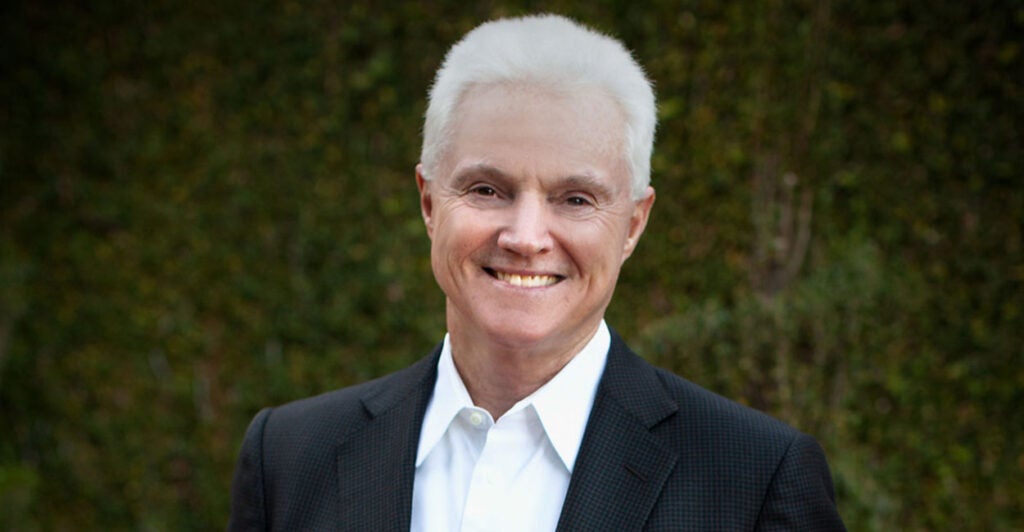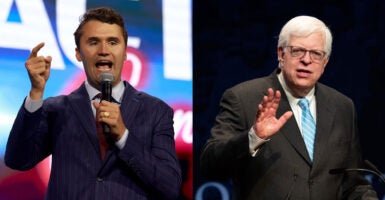Tom Lewis is among America’s most generous philanthropists. Over more than 20 years, his T.W. Lewis Foundation has funded causes helping children and families, educational institutions, and nonprofit organizations like The Heritage Foundation.
But he’s now taking a different approach with colleges and universities after a controversy at Arizona State University. Lewis pulled his funding following the school’s mishandling of an event with Charlie Kirk and Dennis Prager in February.
The Arizona State event was hosted by the university’s T.W. Lewis Center for Personal Development. It sparked outrage from professors and accusations of censorship from the center’s former executive director.
Lewis spoke to The Daily Signal about his decision to pull the funding and the state of higher education in America. Listen to the full interview on “The Daily Signal Podcast” or read a lightly edited version below. (The Daily Signal is the news outlet of The Heritage Foundation.)
Rob Bluey: Tom, welcome back to “The Daily Signal Podcast.” We’re always grateful to have guests return, and especially grateful for you given your support for our organization.
Tom Lewis: Well, thank you, Rob. I’ve been involved with Heritage for a long time and my respect for Heritage continues to grow. And really appreciate the work you do there too.
Bluey: When you appeared on our show last year, we talked mostly about your book “Solid Ground: A Foundation for Winning in Work and in Life.” And I remember from that interview what an important role college played in your life. That’s certainly relevant to the topic that we’re talking about today, given the controversy at Arizona State.
But before we get into that, I would really appreciate your sharing with people about your life and why college and your experiences in the workforce shaped how you think and basically how you make the donations with the T.W. Lewis Foundation.
Lewis: I grew up in Lexington, Kentucky. My dad was Navy for 20 years. We moved around until I was about 12. And then we returned back to my parents’ home, which is Kentucky.
And mostly, my parents were from Eastern Kentucky, Appalachia, and I used to spend a lot of summers up there with a lot of the natives of Eastern Kentucky, and those were my relatives.
But we grew up in Lexington, which is a nice town with pretty good schools, and I never considered going anywhere. I really couldn’t afford it, other than the University of Kentucky. And I became a big Kentucky fan when I got there anyway with football and basketball. And it was right there in our backyard, so I was kind of hooked by the time I was 13 on Kentucky. And I like to joke, when I went there, I got a full scholarship coming out of high school.
A philanthropist happened to die in a plane crash about that time, and he set up a scholarship to go to the University of Kentucky and major in engineering. And I got that scholarship and it was full tuition. And the tuition in 1967 was $115 a semester. So that’s hard to believe now, but that’s what it was, $900 for four years.
But the point, though, was that that scholarship meant so much to me. Back then, that was a big deal, and my mother was happy and my family was happy, and it was just—it meant a lot.
So I understood how much scholarships mean to kids coming out of high school. It’s really an endorsement of them, and somebody else other than their mother and father see potential in them. And so that was my big impression there. And then I was so active at Kentucky as a student leader.
And really, most of the things I learned were outside the classroom, getting involved in campus activities and leadership activities, living in a fraternity house, and just had so many friends and it was so much fun, and good teachers. And it was a great experience, the most fun I’ve ever had in my life.
I have always been a huge advocate of college, and I love to travel the country and go to football and basketball games on different campuses and just always enjoyed being on college campuses and being around college students.
When I became a donor, which was over 25 years ago, I started donating to, first, University of Kentucky, then to University of North Carolina at Chapel Hill, where I got my MBA. And then later, in Arizona, where we live, [Arizona State University] and the Barrett Honors College.
And so for 20 years, I gave money to all three of these schools. And usually, they were one- to two- to three-year gifts. And then they were supposed to do something, and then they didn’t really do it. And then I would get on them about it, and then they would promise to do better. And then I would do it again, and just over and over.
And the 20 years that I gave to all three of these universities was really, I have to say, a steady series of disappointments, where, for example, you sponsor a class and you pay for a faculty member, and they’re supposed to teach a course on some subject and use books as resources. Well, they refuse to use any book that a donor would recommend. But they don’t tell you that. They just don’t do it. Then they morph the content of the class away from your intent, toward whatever they want to teach.

It was hard to really learn that, but that’s what happened. That’s kind of a summary of what happened over the 20 years. And it makes me think of the saying, how do things go bad? And the joke is that at first, it starts gradually, and then it happens suddenly.
And I think that’s really the short story of public universities in America over the last 40 years, really, is they’ve been gradually getting worse relative to their curriculum and their product quality. And then when the George Floyd incident happened and COVID happened, it happened very suddenly. And now I think, finally, most people are waking up to that.
Bluey: You mentioned your gift to Arizona State. You began giving several years ago and you established a center with your name on it. And it was quite prominent, featured in the news of over the last several months, given a controversial event that took place with Charlie Kirk and Dennis Prager, two good friends of this organization and this show. The T.W. Lewis Center for Personal Development hosted that event.
Tell us what exactly transpired in February and what led you to make the decision that you would no longer fund Arizona State?
Lewis: We have a executive director in this program at ASU called the T.W. Lewis Center for Personal Development. And the concept behind that center was, first of all, to better prepare the students for the challenges and opportunities of life. And the way you prepare them is to make them smarter and make them stronger.
So we were going to make them stronger by providing workshops on how to balance your checkbook and buy a car and have speaker series to get to talk to and hear from doctors and lawyers and people from all walks of life and all different career types. Because in college, nobody on the college campus has a clue about what it’s like to navigate a career outside of academia.
And so most people are not there to get a Ph.D., so they don’t—there’s no one to give anybody any advice and they don’t bring in these kinds of speakers.
So that’s what the center was all about.
We also, though, included in our gift agreement that it would be speakers that would address traditional American values, like faith, family freedom, and free enterprise.
Well, I learned later that the free enterprise topic was very controversial. Most of the faculty were anti-capitalist. They didn’t want to teach free enterprise. They wanted to turn it into anti-free enterprise.
But anyway, we went ahead with these speakers series, and we had over 150 events. And we had an event every week for a couple years and it was really a great thing. We had … 7,000 students at Barrett Honors College. And we had a lot of participation and it was really a good thing.
But then we kind of took on a big event to bring in Charlie Kirk and Dennis Prager, and it was kind of a marquee event. We had it in the big auditorium at ASU called the Gammage auditorium, seats about 2,000 or 3,000 people. We put on big events there.
When we scheduled the event, we knew it would be controversial because of Prager and Kirk, but we wanted to make our point that this is America and this is free speech, and these people are going to talk. But the subject matter was health, wealth, and happiness.
And knowing Dennis Prager and Charlie Kirk, know they’re both very strong men of faith, but they’re also incredibly wise men. And then Robert Kiyosaki was also on board to talk about wealth. So it was really a very positive topic.
But then once that word came out, ASU’s reaction from the administrators is, “Well, what are these people going to talk about? We don’t want them talking about anything political.” … They’re starting to come up with these parameters on what they could say and couldn’t.
Then the faculty got really crazy and … 37 out of 47 faculty at Barrett signed a really nasty letter of condemnation for the event. You can find it online. But they were calling Prager and Kirk purveyors of hate and homophobes and things like that. And so it was just got ugly.
Now, then, we went ahead and had the event. There was 1,500 people there, most students, a lot of non-students, actually. But what we learned right after it was how much the students had been suppressed, how teachers in the classroom had told them not to go to the event. If they did go to the event, they might pay a price. And the students that did want to go didn’t want to get filmed in the audience because they didn’t want their teachers to know they attended.
So there’s just all this behind the scenes suppression going on. And the dean of the honors college, Barrett, called in Ann Atkinson, and they wanted to quiz her about why she let this happen.
And so it just got really ugly. And it was pretty clear to me that I had no reason to continue supporting an organization like this where faculty is out of control. They’re very radicalized. I’d say half of them are probably radical, but the other half don’t speak up. And the administrators were complicit. And in their passivity, it was their way of approving. And so they really did approve it.
And a lot of those people don’t believe in free speech. They just don’t think that—if free speech is hate speech, then you can’t say it. And they get to find what hate speech is.
So it really showed and exposed, I believe, a very ugly condition in ASU that I think is in most big public universities, if not all of them, that is just this unwelcome attitude toward what we’ll call conservative thinking and traditional thinking and religion, and things like that that America has been built on.
So there was no way I was going to continue to write checks to them, given the blatant disregard for the intent of our center. And so it was pretty easy to make that decision.
I wrote a letter to the dean and the foundation at ASU and just told them that based on the level of hostility toward these speakers at this event, I could no longer trust them to really steward our fund. And so I terminated our agreement, which I had the right to do. So that’s the short story.
Bluey: Was this the first time that you’ve had to terminate a recurring gift of this nature?
Lewis: No, I actually had two gifts to Barrett. The first one lasted two years and was bigger. But then I realized how badly the faculty was performing, and so I terminated that agreement, but told the dean I wanted to change the agreement and back off on the funding to the courses because the faculty was not adhering to the plan.
So I did do that. That was done quietly. And then we, within a month, implemented a new agreement. … And then the new agreement was the one that I canceled after one year. So, yeah. So I’ve canceled it twice.
Bluey: Amazing. And what is your reaction to Arizona State President Michael Crow’s response, which generated quite a bit of publicity, that he had to come out and state and adhere that Arizona State was adhering to free speech principles?
Lewis: First of all, the Arizona State Legislature called a hearing. It was a one-day hearing. They had Dennis Prager come and speak. They had other people. The director of the program spoke. I did not attend that, but watched it.
So the state Legislature, which is conservative, or is led by conservatives, had that hearing. And then the conclusion was they would give ASU 60 days to respond to the accusations, really.
But I think Michael Crow has kind of tried to stay out of this. I think he’s not really said much at all. He did come out with a statement that said something to the effect that there’s some confused folks out here that don’t understand free speech as it relates to ASU. OK? And so I thought that was kind of interesting. But he’s so buffered by his huge bureaucracy down there that I don’t think he’s really getting a straight story.
I think in his mind—and I know Michael Crow. He’s a good man, but he’s in the ivory tower. And I think in his mind, ASU is a bastion of free speech, but he doesn’t know what’s really going on. And his close advisers aren’t telling him.
So I think this media is getting his attention. And they’ve now hired a law firm to represent them in this hearing request. And so it’s being elevated to a higher level.
But, Rob, what I want to say to your listeners, though, as a longtime lover and donor to universities, is that we need to fix these organizations. But before you can solve a problem, you have to understand it.
And briefly, here’s what I think is the problem. It starts, really, with the faculty. They become more and more radicalized, especially the younger ones. They don’t want to teach. They want to teach—it’s always been a three-three load, three courses per semester. That’s not very much. They want to teach two-two loads. They want to have six students in their classes or fewer students. They complain about too many classes, too many students. They don’t believe in free speech.
On most campuses, there’s this concept. It’s really misleading. They call it shared governance. And the presidents of the universities use that phrase because they share governance of the university with faculty. And so in other words, that gives faculty this concept that they have a voice and their voice matters. Well, most of the time, it doesn’t matter, but they like to be led to believe that it does.
And then there’s this issue of academic freedom. Academic freedom has always meant, used to mean the freedom of a professor or teacher to pursue truth in their discipline, wherever it leads them. That was always the definition of academic freedom.
But like the Left always does, they redefine things. And so they’ve now expanded that to where they have—somewhere, I read a statement that they believe they have the right to weigh in on any social or political issue inside or outside the classroom and say whatever they want, whenever they want, to whoever they want. So they feel like they have this superior freedom.
And I got a phone call yesterday, Rob, from the student at Barrett that was really upset by this. She’s a foreign student, but she wants to talk to me about how she felt whenever she would want to say something that they didn’t agree with. And so there’s a lot of kids like that and my heart goes out to them.
So, anyway, the faculty is kind of, to me, the problem. And it’s literally the inmates running the asylum. … And if you look around at the university and you try to find the person that is in charge of improving curricula, you can’t find them because there is no one.
One time I was talking to a provost, who is supposed to be the top academic officer, I believe, of a major university. And I asked him what his top goal was. And that was kind of a trick question. I wanted to see what he said. And he said, “Increasing enrollment by 20%.”
So that’s the chief academic officer. That’s what they want. They know that college applicants are going down. They know out-of-state students pay more. They know international students are easy to get and pay more. So that’s what they’re trying to do. And they’re all competing with each other.
But the administrators, though, are complicit in all of this. And they act like they’re not. They act like they’re above it. Michael Crow’s comment when someone asked him what’s going on at ASU after this event, his reaction was, “Well, that’s just faculty being faculty.”
It’d be like your children throwing spears at somebody. And then the parents saying, “Oh, that’s just kids being kids.” So that’s what he said, “Faculty being faculty.”
So … the administrators are complicit in this whole thing. And the faculty is kind of the point of the spear.
But I think the solution, I think, get a Republican governor. I was just in Aspen yesterday with the Republican Governors Association, and there’s a lot of good Republican governors, 26 of them right now. And like [Florida Gov.] Ron DeSantis, they can first pull [diversity, equity, and inclusion] and [critical race theory] out of the classroom.
This thing right now through Title IX and DEI bureaucracy, most universities have a DEI officer in every college. And so, for example, at the University of Kentucky, there’s, like, 26 colleges. They have 26 DEI officers, usually full time. So these are just people that are running around trying to enforce all these race, gender, class, racial kind of perspectives on everything. …
So anyway, I think we start with eliminating DEI and CRT, but I think donor pressure on funding. Donors need to wake up and realize what they’re funding. And I think most of the main donors at these public universities are conservatives.
I know that the two biggest donors at ASU, they’re both friends of mine, they’re both conservative. I know the top three donors at the University of Kentucky, they’re all conservative. So somehow the conservatives tend to be the big donors. And I think you’re going to see a lot of that changed.
Bluey: Having recently interviewed Chris Rufo about his new book, “America’s Cultural Revolution,” it’s quite clear to me that this is the Left’s long march through institutions and it’s the consequence of that.
A two-part question for you, Tom. You said you recently spoke to a student. So how should students who hold Christian or conservative beliefs navigate the anti-free speech environment that you speak of on college campuses? And then, to your last point, what advice do you have for others who may be in a similar position to you as donors?
Lewis: I’d say, first, on the students, it’s hard. Because if you’re 19 years old, you want to fit in, and you want to go along, and that’s very natural. So that’s why the suppression is so unfair.
But I think, first of all, today, if you’re a conservative student, I think you have to get a support group, and then you have to stand together. And then you have to raise your hand and speak out and let the chips fall and not be intimidated. But you do need a support group of other students. And that’s what I would hope for.
Then I think, relative to other donors, every donor has their own reason for giving. And mine was just always to try to help students have better lives and better careers and find their talent and things that I talk about in my book.
That book was written for college students, really, on how to be successful. And it was also based on a lot of myths that are being promulgated out there today, like find your passion; do what you love; live your dream; 30’s the new 20; work smarter, not harder. That’s what they’re hearing.
So it’s really bad. It’s not just bad advice, it’s terrible advice, and it’s wrong. And so it doesn’t work. So that’s really why I wrote “Solid Ground,” was to try to address the many myths that are out there in culture. And they basically are living loud at public universities.
Bluey: Tom, how will this recent controversy, in your experiences with higher ed, shape how you make future gifts from the T.W. Lewis Foundation?
Lewis: I’m going to take a pause on any public universities for a while. I’m pretty much wrapped up there. I am wrapped up there.
And so our foundation is very active. We give to a lot of different causes, from foster children, to battered women, to Christian education, to medical programs for melanoma and migraines, to organizations like Heritage and Arizona First Policy Institute and a lot of the good conservative groups in D.C. that are really making a difference for our movement.
So there are plenty of good organizations to give to. There’s no shortage. But you just have to pick and choose. And I think, as I’ve become an experienced donor, I have expectations for every gift that we make, and I think that’s appropriate. And when the expectations aren’t met, you maybe give them another chance. And then if they don’t do it, you go somewhere else. And that’s what I think everyone should do.
Bluey: I appreciated the advice that you circulated in the wake of everything and suggesting that these universities should really talk to their customers, the parents and the students who are the ones who are ultimately supposed to be there in a learning environment, and hopefully learning the American principles of free speech as first and foremost.
And so … closing words from you as to where you see things going next. Are you leaving us on a optimistic note or are you leaving us on a pessimistic note about the future of higher ed in America?
Lewis: I think we’re kind of at a bit of a crossroads. I think there’s not much optimism out there right now in the public universities. I think public universities need what K-12 is getting, which is school choice, or let’s call it school freedom.
So I think we need to increasingly offer alternatives to public education or public university education. There’s a lot of those out there from two-year trade programs to community colleges to small colleges.
And I think parents are going to need to get involved and get a little smarter about what’s going on in the school where they’re sending their children. Because so many parents in America over the last 20 years have sent their kids away to college, and then when they come back, they don’t recognize them. And as Dennis Prager talks about a lot, as he talks about a lot, there’s so many kids that don’t even talk to their parents anymore. So you really need to be, as a parent, very aware of what the school is teaching.
Bluey: Tom, I really encourage our listeners to pick up a copy of your book. Again, it’s called “Solid Ground: A Foundation for Winning in Work and in Life.” Leave us with some thoughts about where they can follow your work, pick up a copy of the book. Anything else, closing thoughts on your mind today?
Lewis: Well, we’re getting a little more active on social media. Our handle is @TWLewis_. And so we’re beginning to put some more messages out there. And also promoting the message of “Solid Ground,” because I still think that’s very relevant.
But it’s an interesting world and I think we see a big challenge here. And I think there’s a lot of people that are really upset and have seen this thing happening in universities for a long, long time. And I’ve heard from hundreds of people, many that I don’t know, some from as far away as London, England. And so this is, I think, touching a nerve. And I think that’s how solutions begin, is awareness.
Bluey: Tom Lewis, thank you so much for standing up for these important principles and for the many contributions you’ve made to help our country and help so many individuals benefit and have an opportunity, just like somebody gave you when you were approaching college yourself.
We’re grateful that you would join us again on “The Daily Signal Podcast.” Tom, please keep us posted on what you have happening in the future. We’d love to have you back again.
Lewis: Great, Rob. Always look forward to talking with you and look forward to staying in touch.
Have an opinion about this article? To sound off, please email [email protected], and we’ll consider publishing your edited remarks in our regular “We Hear You” feature. Remember to include the url or headline of the article plus your name and town and/or state.































